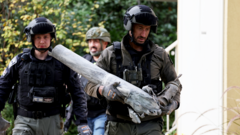Local leaders and residents reflect on the ceasefire's implications, with some expressing hope that it may enable displaced families to return home, while others view it as a temporary respite rather than a long-term solution to ongoing tensions. Mayor Michael Kabesa of Hatzor Haglilit described the ceasefire as potentially a “surrender agreement,” warning that Hezbollah's power could re-emerge. Conversely, residents like Chris Coyle from Kiryat Shmona remain hopeful that a lasting peace will breathe life back into their devastated communities. The situation underscores the complexities of regional security, as both sides gear up for a potential return to hostilities if conditions deteriorate.
Despite international support for the ceasefire, including involvement from U.S. and French forces to facilitate handovers to Lebanese control in the coming months, local populations are unsure that external powers can truly ensure their safety. Opinions diverge sharply, with calls for a renewed military presence from Israel to bolster residents' confidence and an acknowledgment of the precarious nature of peace in the region. The impact of the ongoing conflict and recent traumas weighs heavily on the psyche of those living along the border, leading to mixed sentiments about the truce’s future viability and the political decisions that will shape their lives moving forward.
Despite international support for the ceasefire, including involvement from U.S. and French forces to facilitate handovers to Lebanese control in the coming months, local populations are unsure that external powers can truly ensure their safety. Opinions diverge sharply, with calls for a renewed military presence from Israel to bolster residents' confidence and an acknowledgment of the precarious nature of peace in the region. The impact of the ongoing conflict and recent traumas weighs heavily on the psyche of those living along the border, leading to mixed sentiments about the truce’s future viability and the political decisions that will shape their lives moving forward.




















